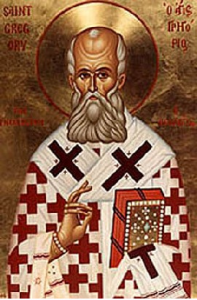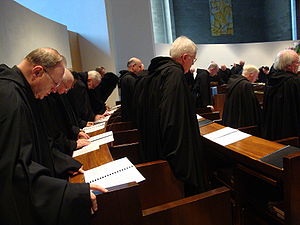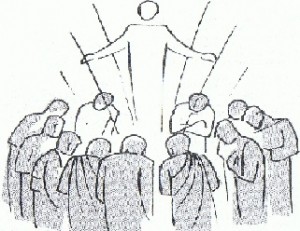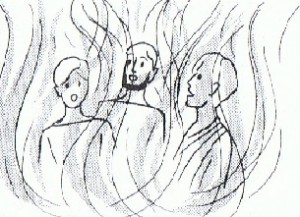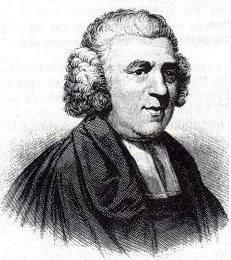Monks regularly pray together in the Divine Office. At Ampleforth, we pray formally six times together on most days, including the celebration of Mass. With this background, you would think that it would be easy for men, who pray daily together in a formal way, to pray together, informally, as other issues arise and when monks meet up with each other; perhaps some do! But, this is not within my experience. Strangely, it is not easy, for instance, to say to a brother monk: “We have a problem here; let us pray about it together.” We would often discuss the problem and try to think of a solution; certainly, we would try to support, and help each other as best we could, and in so far as that was possible. But Pray?
The Monks in Prayer Together at Ampleforth
The causes of this anomalous situation maybe numerous and varied, but one thing comes to mind. Ritual, like anything ‘formal’ does not allow people necessarily to come to know, appreciate or ‘belong to each other’, in that ‘close’ way taught by Jesus to his disciples. To follow Jesus’ way, that ‘inner spirit’ needs to engendered and nurtured, and formality does not necessarily achieve this. An analogy, for parishioners, would be that attending Mass each Sunday may be more an external ritual, than an inner conversion – for the lay person – and even for the priest who presides at Mass. We need to go below the surface, go that ‘extra yard’ in order to experience that ‘inner’ change, a change very close to the true meaning of ‘repentance’ in the Gospel.
It is true that, in any family, there may be stresses and strains in the relationships, and this can happen for various reasons; similarly, stresses and strains may affect ‘relationships’ and the good-will that brothers in religion can be expected to have. Praying together is one thing. However, it could happen that circumstances render it impossible even to discuss a given situation, once communications have broken down. This is what life is like, in practice – for better, or worse! Objectively speaking, it is strange that monks take for granted praying with each other, in a structured and formal way, but find it more difficult, in a personal way, to pray together when there are simple – even more serious – needs. I would wager that few men and women, in religious life, find it easy to pray ‘informally’, with their fellows.
Putting all this on a whole new different footing, I remember one day talking with engaged couples, about God in married life. The married couple who led the sessions, talked about their experience of prayer together. They were, both, deeply committed Catholic Christians, regularly worshipping God, in Church on Sundays, and on some other days. They confessed that, when they were first married, they never prayed together; however, as time went on, and other good experiences came their way, they tentatively began to join in prayer. At first, they were embarrassed to pray together but, eventually, they went through a kind of ‘barrier’ and now they find it something natural, and an important part of their lives. In fact, they said that praying together was one, really beautiful, expression of their love for each other, and I found this easy to accept.
Because of my involvement in the lay movement called the ‘Focolare Movement’, I have learned about praying, together, with others. When talking about the ‘Focolare’, it is important to bear in mind that the characteristic God gave to this particular movement is ‘unity’, and that is a gift that can be applicable to every kind of human association – and to all types of person. So, for instance, unity is needed in the work place, among artists, or politicians, teachers, or those in the medical profession. It is a gift to bishops, priests, those in religious life, young and old people, families, parishes, whole communities of Christians and so forth; indeed, it is gift of God to everyone. Unity is also important for those who belong to other religions, like Buddhists, Hindus, Muslims and Jews. I have met people falling into all of these categories, including atheists, and agnostics, who are associated with the ‘Focolare’. This spirit of unity attracts, and can be of great help, to all these different kinds of people.
One of the characteristic behavioural patterns, of those associated with the ‘Focolare’, is to pray with each other. In the Gospel, there are two verses that are particularly apposite to this:
“Again, truly I tell you, if two of you agree on earth about anything you ask, it will be done for you by my Father in heaven.
For where two or three are gathered in my name, I am there among them.” (Mt. 18: 19-20)
Jesus Among His Disciples
In this, it is important to note that, somehow, the culture that the ‘Focolare’ engenders’, enables people to pray together’ about the most simple, or very serious things, without any fuss or embarrassment. This last week, I have prayed for serious matters such as family situations, as well as less complicated, but still serious things, like the need to find a valuable camera, or a wallet containing credit cards and money. But usually, such prayers have been in company with lay people!
Three Men Praying
Once again, I ask, is that not rather a strange phenomenon? All of this has been occupying my mind and, during this last week, the decision was made to pray, with fellow monks of my own community, outside our ‘formal’ prayer times. This has come as a blessing, for not only did we find the lost wallet and the valuable camera, but it seemed to ‘cement’ relationships. Self-analysis reveals that ‘formal’ prayer together was not enough, in my case, to begin the art of praying, informally and with conviction, in the company of my fellow monks. To be precise, embarrassment is apparently one of the problems; however, there are also aspects of seeming to be ‘holier than thou’, not wanting to ‘lose face’ or to be thought ‘soft-in-the-head’. It is also very interesting to add that it has been lay people, who have taught me about praying with others, in this delightful, but informal, way.
Fundamentally, it is important that Jesus, or God himself, becomes more ‘believable’ when you discover the power associated with praying together. It may be something we should broach with those, with whom we are closely associated, and see what actually happens.
Perhaps there is a lesson to be learned, here, by all those of us who are priests.
(Unfortunately, in sending out this blog by e-mail, ‘Word Press’ distorts the original formatting of the document. Readers are, therefore, advised to visit the website www.stmarysblog.co.uk should they wish to read it in its intended format).


